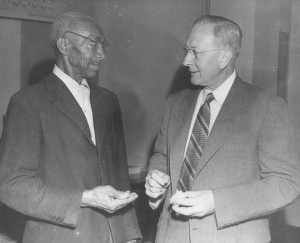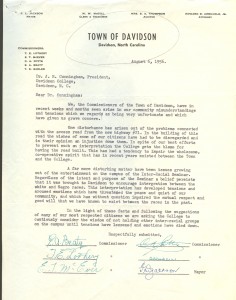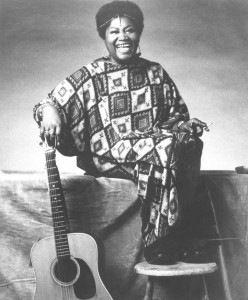Later this month– May 19th through the 30th — groups in Charlotte will be marking the 50th anniversary of the 1963 “eat-ins”. The eat-ins involved local leaders from the white and black communities going in pairs to Charlotte restaurants to share a meal and moving the city into desegregation of public spaces.
Davidson’s tie to the eat-ins is through John Cunningham. President from1941 to 1957, Cunningham moved to Charlotte after his retirement from the college. While at Davidson, he was active in church work and social causes and he continued those interests in Charlotte.
In1943, Cunningham attended a gathering of religious leaders from across the south and encompassing Presbyterian, Episcopalian, Methodist, and Baptist groups. The Davidsonian reported on this trip and his conversation with students about it:
The main interest of the Atlanta group seemed to be to raise negro educational, health, and economic conditions and standards to proportionate with white levels. Many appalling examples of unfairness and plain crookedness in nearby and respected communities were cited by Dr. Cunningham. ‘One thing that is difficult to comprehend,’ he declared is the slowness with which the Church, including our own, is facing this problem. It seems to be the opinion of intelligent leaders everywhere, both Christian and non-Christian, that it is the Church’s position and duty to lead in the alleviation of the problem.’
Cunningham lived into his concern, assisting the Johnson C. Smith University Development Program Advisory Committee and serving on the Advisory Board for the Presbyterian Negro Work Campaign. Concerning the latter, he write:
The Presbyterian Negro Work Campaign is one of the most needed, and most encouraging undertakings of our Church in a long time. It is Christian work which deserves the prayerful and generous support of all our people. There is related to it a spiritual blessing to local congregations and to the Assembly as a whole if it captures our imaginations and elicits our widespread participation. It is one of those noble objectives which ought to be done quickly and wholeheartedly.
A few years later, he had the opportunity to put his words into action by accepting a request from the American Friends Service Committee to host an international gathering of students at Davidson. The group was integrated and not to the liking of all in the local area. There were cross -burnings and eventually a letter from the town commissioners asking the College to cautiously consider the wisdom of not holding other inter-racial groups on the campus until tensions have lessened and emotions have died down.” In response to these concerns, he wrote a compassionate letter to the Mecklenburg Gazette.
We don’t have any correspondence to show that John Cunningham was aware of the difficulties Davidson College encountered in February of 1963 trying to find a hotel for the singer Odetta, who was scheduled to sing at the college. If he did, it might have furthered his convictions in helping to organize the Charlotte desegregation activities later that spring. And even if he did not, this experience showed why Charlotte needed his leadership that spring.





Speak Your Mind